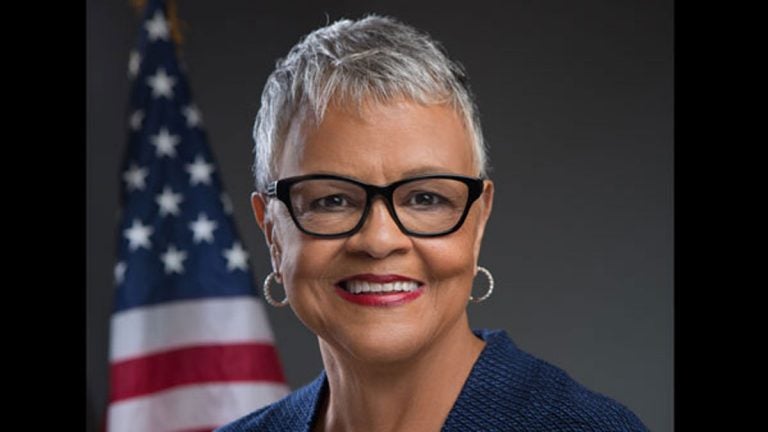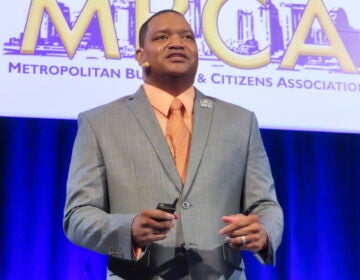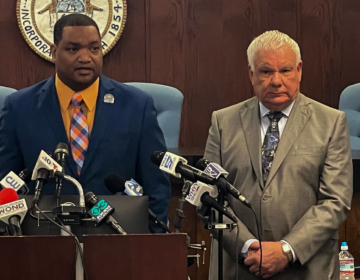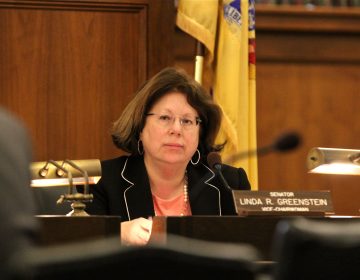The candidates for New Jersey’s 12th Congressional District

Bonnie Watson Coleman
 The contest for the U.S. House seat representing the state capital district is crowded, but cordial, with those looking to unseat freshman Democrat Bonnie Watson Coleman praising, rather than criticizing her.
The contest for the U.S. House seat representing the state capital district is crowded, but cordial, with those looking to unseat freshman Democrat Bonnie Watson Coleman praising, rather than criticizing her.
With a total of seven candidates, including the incumbent, the 12th District race is tied for the most crowded in New Jersey this year. Watson Coleman, 71, of Ewing, is facing Republican hopeful Steven Uccio, 30, of East Windsor, and five independents as she seeks reelection to the Central Jersey district that includes Trenton, Princeton, and other Mercer County municipalities, as well as parts of Middlesex, Somerset, and Union counties.
Four of the challengers — Uccio, Michael Bollentin of Hightstown, R. Edward Forchion of Trenton, and Steven Welzer of East Windsor — expressed their views on the campaign and the incumbent. All have nothing negative to say about her, using such terms as “nice,” “grandmotherly,” “very experienced,” and like a “church lady.” Instead, they all said they are running to promote their own agendas if elected.
Watson Coleman won 61 percent of the vote two years ago to become New Jersey’s first African-American congresswoman, following a 16-year career in the state Assembly, where she served two terms as majority leader. A former chair of the New Jersey Democratic State Committee, she is currently serving on the Committee on Oversight and Government Reform and the Committee on Homeland Security, where she is ranking member on the Subcommittee on Homeland Oversight.
But the mother of three and grandmother of two said her proudest moments involved her work with the Congressional Progressive Caucus, “raising issues like equal pay for equal work and a woman’s right to choose on a regular basis” and participating in last June’s sit-in on the floor of the House in an effort to force House Republicans to act on gun control legislation.
“It’s been exciting, dynamic, surprising, frustrating,” Watson Coleman said in describing her first term in office. “Most of all, it’s been great having the opportunity to work in a space that needs to hear voices such as mine.”
She said she hopes to be reelected so she can continue to work on issues about which she is passionate: women’s issues, clean air and water, affordable and accessible healthcare, and criminal justice and sentencing reform, including alternatives to incarceration.
Steven J. Uccio, Libertarian-turned-Republican challenger in District 12
This is not the first time Uccio, a co-manager of a meat wholesaling company, has run for office, but it is his first time as a Republican, having run in the past as a Libertarian and still holding some positions in line with those of the Libertarian party. He said he switched this year because he has learned “if you are not a Democrat or a Republican, you are not going to win.”
The married father of a toddler said he has been interested in politics since high school and is running because he believes he might do a better job. Improving the economy and reducing the national debt are his main focus.
Steven Welzer, Green candidate for House seat in District 12
Gaining exposure for third parties, in his case, the Green Party, is a primary motivation behind Welzer’s candidacy. He has also run for office — governor and state assembly — in the past, always as a Green. Welzer, 66, has been an activist in the Green movement for more than two decades. He is retired, following a career in information technology with the state.
A married father of two and grandfather of three, Welzer’s main goal is “opening up the electoral system to more voices and more choices.” He said polling supports this goal, as “a majority of Americans would like to see alternative parties give the Democrats and Republicans some competition.” He said the adoption of a “better voting system,” such as ranked choice voting, in which voters rank up to three candidates in order of preference, rather than choosing just one, would give parties like the Green “a chance to be more viable.”
Another experienced candidate with a specific platform is Forchion, 52, running under the “Legalize Marijuana Party” banner. Known as “NJ Weedman,” he noted he has “been a protest candidate off and on for years” elsewhere in the state and is on the ballot in the 12th after moving to Trenton last year. Forchion, who has faced legal troubles over the years and has others pending, mostly due to his marijuana use, currently operates a restaurant called NJ Weedman’s Joint that recently reopened after being temporarily shut for allegedly violating a city ordinance.
R. Edward Forchion, aka “Weedman”
A video of Forchion’s announcement is posted on YouTube.
A divorced father of five grown children, Forchion said marijuana laws are the among the most violated and the substance should be legalized. He said he hopes he may get more votes this year, with public opinion increasingly favoring the legalization of pot.
“My whole life has been affected by the war on drugs,” said Forchion, whose first drug arrest was in 1997, resulting in his spending about 22 months in prison. “My life was on track until I was arrested for marijuana. It’s the source of my whole anger, my whole dedication.”
Of the four challengers who provided information about their campaigns, only Bollentin is a political neophyte. A retired police officer who now works in emergency medical services, he said he is running out of frustration with the two-party system.
“I’m kinda just fed up with the nonsense,” said Bollentin, whose slogan is “We the People.” “I don’t think either side represents the country.”
A married father of two, Bollentin said his main concerns are getting rid of waste and redundancy in government and improving the treatment of veterans.
The other two candidates on the ballot did not return requests for comment. Thomas Fitzpatrick of South Bound Brook is running as a Libertarian. The NJ Division of Elections lists Robert Shapiro, running as a “Teddy Roosevelt Progressive,” as having a Princeton post office box on its official candidates’ list, but the website Ballotpedia has him living in Cherry Hill, and he ran for Congress two years ago in the 1st District, which includes the township.
Watson Coleman is the only candidate with any real campaign war chest. She has a huge advantage over Uccio: The Democrat has raised more than $1 million and had $365,000 still in the bank as of Oct. 19, while the Republican has raised $4,539 and had just $659 on hand on September 30, according to his most recent filing with the Federal Election Commission. The FEC showed no financial activity for Bollentin, and a search turned up no records — not even a statement of candidacy filing — for Fitzpatrick, Forchion, Shapiro, or Welzer.
Here’s how the candidates stand on some key issues:
The economy/job creation
Watson Coleman said the nation needs a program similar to the post-Great Recession New Deal to rebuild roads, bridges, and transit systems. These infrastructure improvements would, at the same time, provide good jobs for those who are unemployed or underemployed. She also supports “incentivizing younger students” to get interested in STEM (science, technology, engineering and math) and making sure higher education — be it college or trade school — is affordable, so students can gain the education or skills they need to get good jobs. Watson Coleman also supports increasing paid internships and apprenticeships as a way of helping people find employment.
Uccio suggested simplifying the tax code and decreasing the nation’s indebtedness as two ways to improve the economy. He would also look to cutting some federal agencies, including the National Security Agency and the Transportation Security Administration, transferring the latter’s duties back to airports with some limited government oversight. He said allowing the cultivation of industrial hemp — a non-psychoactive form of cannabis — would bring some jobs to New Jersey, and removing regulations from such “sharing” services as Airbnb and Uber might not create traditional jobs but would “let people make money for themselves.”
Bollentin agreed with Watson Coleman that improving the nation’s infrastructure is a good way to create jobs. He also said a national push for renewable energy technologies would also bring additional jobs. Bollentin supports bolstering training in the trades and other professions that “computers can’t do” to get people into good jobs that will continue to exist, as well as to help those who don’t like or have difficulty with college. “College is not necessarily for everybody,” he said.
Forchion said the United States needs to renegotiate such trade agreements as NAFTA — the North American Free Trade Agreement — that have hurt the middle and lower classes.” We have lost thousands and thousands of manufacturing jobs,” he said.
Welzer advocates funding a “Green New Deal,” through progressive income taxation and by cutting the military budget. “Monies could then be available to set up a full employment program that would create millions of jobs by implementing a locally controlled direct employment initiative,” in effect replacing unemployment offices with local employment offices, he said. “There is plenty of socially and environmentally significant work to be done. The focus should be on jobs in sustainable energy, efficiency retrofitting, mass transit, organic agriculture, cleanup of toxic sites, etc.” Welzer also proposes establishing job bank databases of public sector jobs for those who can’t find work in the private sector.
Housing
Watson Coleman said she wants to see affordable housing built throughout the state, not just in urban centers. She supports federal Department of Housing and Urban Development proposals to provide building incentives, but only for groupings of low-rise homes rather than high-rise buildings, “which have been proven to not work for families.” She also wants to see additional housing specifically for veterans. In all cases, “Congress needs to put money behind programs,” she said, adding that states like New Jersey also need to do their part. Finally, the greater issue behind homelessness and housing affordability is the high poverty rate.
“We have to reduce poverty,” Watson Coleman said. “We have to get at those who are unemployed and underemployed. There needs to be a mindset to build up the middle class.”
Rather than “trying to help a very small group of people” by building more affordable housing, Uccio said he supports “making the country less expensive overall,” which would give people more money to use to pay for housing. For instance, Uccio said transferring more responsibility for education from the government to local school boards would lead to cost savings, as well as higher quality, which would in turn lower taxes and help make homes more affordable. He is also calling for the repeal of the federal gasoline tax of 18.4 cents per gallon, saying it is the first bill he would propose if elected.
Bollentin said the nation needs to do whatever it can to care for veterans, including those who are homeless. “We need to take care of our own first,” he said. “There are things we can do better to provide for them.” Regarding others who are homeless, he supports helping people get the resources they need, but said officials need to do that “on an individual basis.” Some people, he said, are homeless by choice.
Forchion supports having HUD take over abandoned homes in certain neighborhoods and turning them over to families and the working poor so they would have a stable and affordable place to live. That would help create more housing stock and solve the problems caused by large numbers of vacant and foreclosed properties in some areas. The lack of affordable housing would also be helped by greater job creation. “The housing shortage is based on the economy,” he said. “People are working all these service jobs” and don’t earn enough money to afford homes.
Welzer has a specific four-point plan to address the affordable housing crisis. He would expand rental and home ownership assistance programs and increase funding for public housing and offer capital grants to nonprofit developers of affordable housing “until all people can obtain decent housing at no more than 25 percent of their income,” he said. Welzer also supports the imposition of an immediate moratorium on foreclosures and evictions. He seeks to create a federal bank with local branches that would take over homes with distressed mortgages and then either restructure the mortgages to affordable levels, or if the occupants still cannot afford a mortgage, rent to the occupants.
Gun control
Watson Coleman said she supports “more responsible” gun laws. She backs comprehensive background checks for all those seeking to purchase a gun, as well as bans on assault weapons and high-capacity ammunition clips. To get these passed, she said the composition of both houses of Congress needs to change, and members should not be so quick to vote the way the National Rifle Association wants. “Basically, the NRA gets its money from gun manufacturers,” she said. “It really is an instrument of the manufacturers,” rather than representing the views of its members.
Uccio said he would be willing to “trade” the imposition of universal background checks for all firearms sales for the creation of a “national universal concealed carry license that would be good throughout the country.” Calling New Jersey’s gun laws “confusing,” Uccio said he does not support either an assault weapons ban or limits on the size of ammunition magazines.
Bollentin termed gun control a “complex” issue. He said he agrees with those seeking to make it harder for those who might be irresponsible to get firearms. “Loopholes need to be closed,” he said. “I am not necessarily a fan of average citizens having fully automatic weapons.” On the other hand, Bollentin, like Uccio, supports a nationwide concealed carry permit. As part of any gun permit, he said people should have to show they know how to properly and safely use a firearm. “As a retired cop, in order to be able to carry a weapon, I have to qualify twice a year,” he said. “It all comes down to being responsible.”
Forchion agreed with Bollentin that gun control is a very complicated issue. As a convicted felon, he said he is not allowed to legally own a gun. But as a business owner, and someone who was not convicted of a violent crime, he feels he has a right to protect himself. “I do believe in the Second Amendment, but I also believe there should be more control over guns,” he said. Forchion said he would not limit additional controls to certain types of firearms, but would like to strengthen the laws in such states as Virginia, Kentucky and Colorado, which he called “super lax.” The issue is personal for another reason, he said. “I had a couple of my friends murdered, and I know the guns were coming from Virginia,” Forchion said.
Welzer supports a retroactive ban on all military-style semi-automatic assault weapons. “Weapons designed for soldiers in war theaters certainly don’t belong on our streets,” he said. A retroactive ban would not only prohibit new sales but also require owners to turn in their assault weapons and be compensated at market value plus an additional percentage. Welzer said that after Australia enacted such a ban in 1996 following a mass shooting there that killed 35, people turned in almost 700,000 weapons, which were destroyed. “Today, there is a consensus that the reforms not only reduced the gun-related homicide rate, but also the suicide rate in that country,” Welzer said. Such a law could lead to 40 million assault weapons being taken off the streets of the United States.
____________________________________
NJ Spotlight, an independent online news service on issues critical to New Jersey, makes its in-depth reporting available to NewsWorks.
WHYY is your source for fact-based, in-depth journalism and information. As a nonprofit organization, we rely on financial support from readers like you. Please give today.




